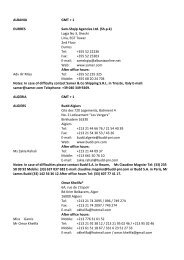the charterer newsletter - Charterers P&I Club
the charterer newsletter - Charterers P&I Club
the charterer newsletter - Charterers P&I Club
Create successful ePaper yourself
Turn your PDF publications into a flip-book with our unique Google optimized e-Paper software.
continued from page 4writers. There ample support is found, so it wasargued in <strong>the</strong> Court of Appeal, for <strong>the</strong>traditional view. The traditionalists argued thatno court should depart from such an approachunless satisfied that <strong>the</strong>y are clearly wrong. Itwas also argued that <strong>the</strong> rule was simple,certain and fair and above all one which wasadopted in practice by <strong>the</strong> shipping market.Contrary views. The owners of <strong>the</strong> Achilleaswhose vessel had been redelivered late saidthat <strong>the</strong> traditionalists had greatly overstated<strong>the</strong> position. There were in fact no Englishcases which had in fact decided as a matter ofabsolute principle <strong>the</strong> damages which shouldapply in a case like this. Whichever way <strong>the</strong><strong>charterer</strong>s tried to argue it, <strong>the</strong> fact remained,(so owners said) that <strong>the</strong>y had undoubtedlysuffered a loss of US$ 1,364,584.37 on accountof <strong>charterer</strong>s breach of contract. On that basis<strong>the</strong>y were entitled to be put in <strong>the</strong> sameposition as if that breach had never occurred.Owners accepted that <strong>the</strong>y were not entitledto recover in respect of any losses which eventhough <strong>the</strong>y were caused by <strong>the</strong> breach weretoo remote. However, no one could ignore <strong>the</strong>fact that <strong>the</strong> arbitrators, having heard all <strong>the</strong>evidence of <strong>the</strong> parties to <strong>the</strong> contract thoughtthat those losses were not too remote.What did <strong>the</strong> judge decide and what did <strong>the</strong>English Court of Appeal decide? Were damagesto be limited to approximately US$160,000 orUS$1.3 million?Having reviewed all <strong>the</strong> arguments andauthorities <strong>the</strong> Judge at first instance had nodoubt that <strong>the</strong> traditionalists were wrong. Hesaid:“To award damages in this case on <strong>the</strong> basis of<strong>the</strong> difference between <strong>the</strong> market rate and<strong>the</strong> charter rate for <strong>the</strong> overrun wouldcompensate <strong>the</strong> owners for only a fraction of<strong>the</strong> true loss caused by <strong>the</strong> breach.” He alsosaid:“I have not come to <strong>the</strong> conclusion I havereached with any sense of regret. As LordAtkinson observed ……..it is a generalprinciple of law that in giving damages forbreach of contract <strong>the</strong> party complainingshould so far as it can be done by money beplaced in <strong>the</strong> same position as he would havebeen if <strong>the</strong> contract had been performed. Thatis a ruling principle. It is a just principle.”Did <strong>the</strong> Court of Appeal accept or reject <strong>the</strong>approach adopted by <strong>the</strong> majority ofarbitrators and <strong>the</strong> judge at first instance? Theapproach was accepted – no overturn <strong>the</strong>y said.They emphasized <strong>the</strong> importance of matterssuch as <strong>the</strong> likely business knowledge of <strong>the</strong><strong>charterer</strong>. They thought that a <strong>charterer</strong> of atime chartered vessel would know and if notcertainly ought to know that a new fixture wasvery likely to be entered into by <strong>the</strong> owner soas to follow as closely as possible <strong>the</strong> redeliveryof <strong>the</strong> vessel. That conclusion was reinforced by<strong>the</strong> fact that this particular <strong>charterer</strong> was wellaware of <strong>the</strong> chartering market and should havebeen wary about <strong>the</strong> danger of late deliverygiven <strong>the</strong>ir background knowledge. They heldthat <strong>the</strong>re was no fixed rule that damages forlate delivery of a time chartered vessel waslimited to <strong>the</strong> overrun period measure. On thatbasis <strong>the</strong> Court of Appeal decided that ownerswere entitled to <strong>the</strong> full sum of <strong>the</strong>ir claim plusinterest plus costs.SUMMARYThe decision in <strong>the</strong> Achilleas has been watchedand waited with great anticipation by ownersand <strong>charterer</strong>s alike. It is likely to have a bigimpact on <strong>the</strong> negotiations for damagecompensation arising out of late delivery.Changes are likely to be needed to <strong>the</strong> tacticsto be adopted by <strong>charterer</strong>s once late deliveryis known to be unavoidable. Of course <strong>the</strong> casecould reach <strong>the</strong> highest court in <strong>the</strong> land – <strong>the</strong>House of Lords, but until <strong>the</strong>n <strong>the</strong> Achilleassounds a clear note of warning for <strong>charterer</strong>sand <strong>the</strong>ir advisers.5



